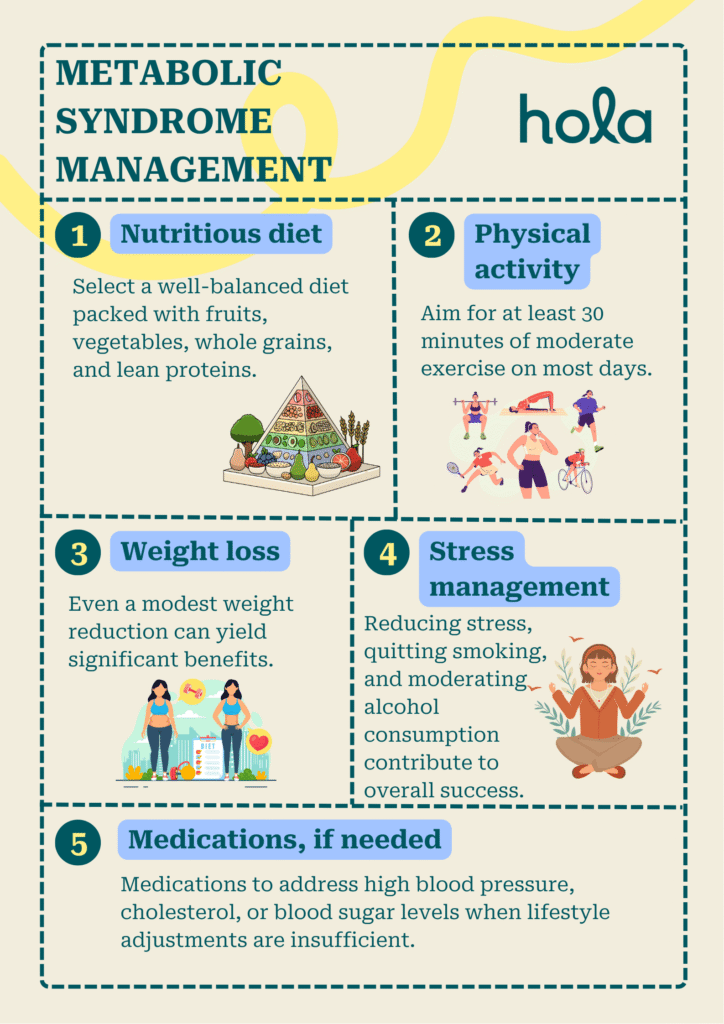Metabolic syndrome: Causes, symptoms, and management
Written by the editorial staff writer at Hola. Medically Reviewed by Dr Nelson Lau, MBBS FRACGP, GP & Digital Health Specialist.

Contents

Summary: Metabolic syndrome is a group of conditions, including increased blood sugar levels, high blood pressure, excess abdominal fat, and abnormal cholesterol levels, that collectively increase the risk of cardiovascular disease, stroke, and type 2 diabetes. It is primarily caused by obesity, insulin resistance, unhealthy lifestyle choices, and hereditary factors. While symptoms may not be obvious, it can be identified through clinical indicators such as increased waist circumference, high blood pressure, and abnormal blood test results. Management involves adopting healthier habits such as a nutritious diet, regular physical activity, weight loss, quitting smoking, and medical treatment if necessary. Early identification and consistent management can significantly lower health risks and improve quality of life.
Metabolic syndrome is a group of interconnected health conditions, including high blood pressure, high blood glucose, increased abdominal obesity, and irregular cholesterol or lipid levels. These issues can collectively increase the risk of heart disease, stroke, and type 2 diabetes. In Australia, over 35% of adults are estimated to have metabolic syndrome, with even higher rates among people living with diabetes. As sedentary lifestyles and processed dietary patterns become increasingly prevalent, it’s important to understand the underlying causes, spot the early signs, and learn how to manage metabolic syndrome for long-term wellness.
Importance of early awareness and diagnosis
Early awareness and diagnosis of metabolic syndrome are essential, as the condition often develops silently with no obvious symptoms and significantly increases the risk of serious diseases like heart attack, stroke, and type 2 diabetes. According to Dr Lau, a GP in Australia, Australians at risk, including those with obesity, a family history of diabetes, or lifestyle-related factors, should undergo regular GP screenings for early detection. Early detection allows you to take proactive steps, such as adopting a healthier diet, staying physically active, and managing weight and blood pressure, to prevent long-term health issues. Early action empowers you to reverse or control the condition before it leads to more severe outcomes.What is metabolic syndrome?
Metabolic syndrome consists of a set of health issues that occur in conjunction and elevate your chances of developing heart disease, stroke, and type 2 diabetes. These issues encompass high blood pressure, elevated blood sugar, excess abdominal fat, and abnormal cholesterol or triglyceride levels. Just having one of these problems doesn't indicate that you have metabolic syndrome, but a combination of three or more can prompt a diagnosis.
It is often associated with being overweight, sedentary, or experiencing insulin resistance. Numerous individuals are unaware that they have it because the symptoms can be subtle. Nevertheless, early identification is crucial. Through appropriate lifestyle modifications and treatment, metabolic syndrome can be effectively managed to mitigate long-term health risks.
Causes and risk factors of metabolic syndrome
The development of metabolic syndrome arises from a mix of genetic, lifestyle, and environmental influences.- One significant contributor is insulin resistance, which occurs when the body’s cells fail to respond adequately to insulin, resulting in elevated blood sugar levels.
- Carrying excess weight or being obese, particularly if the extra fat is around the abdomen, greatly heightens the risk. A lifestyle that lacks physical activity also plays a role in this syndrome.
- Additional risk factors include poor dietary habits, such as consuming high amounts of processed foods, sugar, and unhealthy fats. Age is another factor, as the risk tends to rise as you age.
- Certain medical conditions, like high blood pressure, elevated cholesterol, and polycystic ovary syndrome (PCOS), can also increase your likelihood of developing metabolic syndrome. Family history and ethnic background, including Aboriginal and Torres Strait Islander peoples and those of South Asian descent, may influence risk levels as well.
Also read: Reversing prediabetes naturally: A GP’s guide
Signs and symptoms of metabolic syndrome
Metabolic syndrome frequently presents without clear symptoms, which is why it can often go undetected for an extended period. However, some indicators might suggest its presence. A primary physical marker is excess fat in the abdominal area, often referred to as abdominal obesity or an “apple-shaped” body.
Other potential symptoms include high blood pressure, raised blood sugar levels, and irregular cholesterol or triglyceride levels, although these typically require medical evaluation to identify. Some individuals might feel fatigued, have trouble focusing, or generally feel unwell, although these signs are less specific.
Since the syndrome comprises multiple risk factors, regular health screenings are vital, particularly if you possess risk factors such as obesity or a family history. Early diagnosis is crucial in preventing severe complications like heart disease and diabetes.
Also read: How to reduce inflammation in the body - Doctor's pick
Feeling sick and unsure why? Speak with a GP online in 15 minutes.
Health risks and complications
The presence of metabolic syndrome markedly increases the risk of developing serious health issues. Type 2 diabetes is the most prevalent complication, as insulin resistance tends to worsen over time, making blood sugar control more challenging. Individuals with metabolic syndrome also have a heightened likelihood of experiencing heart disease and stroke due to its impact on blood pressure, cholesterol, and overall artery health.
Other potential complications may include fatty liver disease, kidney dysfunction, and an increased risk of blood clots. The cumulative effects of high blood pressure, poor cholesterol levels, and excess abdominal fat can lead to inflammation and damage to blood vessels.
Metabolic syndrome management and treatment
Effectively managing metabolic syndrome is essential to lower health risks and enhance well-being. Treatment generally entails a blend of lifestyle modifications and, when necessary, medication. Here are the main strategies:- Nutritious diet: Select a well-balanced diet packed with fruits, vegetables, whole grains, and lean proteins. Avoid processed foods, sugary beverages, and unhealthy fats.
- Consistent physical exercise: Aim for at least 30 minutes of moderate exercise on most days. Activities such as walking, swimming, or cycling aid in weight management and boost heart health.
- Weight loss: Shedding excess abdominal fat can lead to improvements in blood pressure, cholesterol, and blood sugar levels. Even a modest weight reduction can yield significant benefits. Dr Lau comments It may also be useful to consider consulting accredited dietitians or exercise physiologists.
- Medications, if necessary: Healthcare providers may prescribe medications to address high blood pressure, cholesterol, or blood sugar levels when lifestyle adjustments are insufficient.
- Effective stress management: Reducing stress, quitting smoking, and moderating alcohol consumption contribute to overall treatment success and lower complication rates.

When to see an online GP
Suppose you observe symptoms associated with metabolic syndrome, such as an increase in waist circumference, elevated blood pressure, or high blood sugar levels. In that case, it may be wise to consult an online Doctor. An online consultation can be particularly beneficial if you are dealing with issues like persistent fatigue, blurry vision, or unexpected weight gain. Connecting with an online doctor is also advisable if you require assistance in managing pre-existing conditions such as diabetes, high cholesterol, or hypertension, which are all components of metabolic syndrome. For those who find it challenging to visit a clinic or seek prompt advice on test results, lifestyle modifications, or medication changes, online GP services provide a convenient and efficient solution. Receiving timely guidance from a healthcare professional can empower you to take appropriate actions before any complications develop. Talk to a telehealth doctor about metabolic syndrome.How telehealth can help manage metabolic syndrome
Telehealth simplifies the management of metabolic syndrome, particularly for individuals with hectic lifestyles or limited access to medical facilities. Via virtual consultations, you can routinely check in with your GP to track vital health indicators such as blood sugar, blood pressure, and cholesterol levels. Doctors can modify medications, assess test results, and offer dietary or exercise recommendations, all from the ease of your home. Telehealth helps to get a medical certificate online also facilitates ongoing lifestyle coaching, aiding you in adhering to healthy practices and making gradual adjustments to enhance your condition. Additionally, telehealth platforms frequently provide access to nutritionists, fitness experts, or mental health professionals, who are all beneficial when managing a chronic condition like metabolic syndrome. This method promotes consistent care, timely interventions, and improved health management over time.Conclusion:
Metabolic syndrome is a significant health concern, but it is manageable with timely intervention. Early diagnosis, improved nutrition, regular exercise, and proper medical care can reduce risks and improve overall health.FAQs
What are the signs of metabolic syndrome?
The symptoms of metabolic syndrome often develop slowly and may be subtle at first. Key indicators include:- High blood pressure
- High blood sugar
- High triglycerides
- Increased waist size
- Low High-Density Lipoprotein (HDL) cholesterol
How do you treat metabolic syndrome?
Managing metabolic syndrome involves addressing its root causes, primarily by adopting healthier lifestyle habits and dealing with each contributing risk factor separately. Here’s how it’s treated:- Healthy diet
- Regular exercise
- Quit smoking
- Limit alcohol
- Manage your weight
- Manage stress
- Medications
What causes metabolic syndrome?
Metabolic syndrome is caused by a combination of contributing factors, primarily linked to lifestyle and genetics. The main causes include:- Obesity
- Unhealthy diet
- Physical inactivity
- Insulin resistance
- Genetics and family history
- Hormonal changes
How do I know if I have metabolic syndrome?
You may have metabolic syndrome if you have three or more of the following health indicators:- Large waistline: Over 94cm (men) or 80 cm (women)
- High fasting blood sugar: 5.6 mmol/L or higher, or on medication for diabetes
- High blood pressure: 130/85 mmHg or higher, or using medication for high blood pressure
- Low HDL (good) cholesterol: Less than 1.0 mmol/L (men) or 1.3 mmol/L (women)
Can metabolic syndrome be reversed?
Yes, metabolic syndrome is often reversible if identified early and addressed with healthy lifestyle changes. Losing extra weight, eating a balanced diet, staying physically active, avoiding tobacco, limiting alcohol, and managing stress can significantly improve health and even reverse the condition. In some cases, medication may be necessary to tackle particular risk factors; however, many people see considerable improvements just by altering their lifestyle.Is metabolic syndrome the same as diabetes?
No, metabolic syndrome is different from diabetes, though they are closely related. Metabolic syndrome is a group of conditions—including excess abdominal fat, high blood pressure, high blood sugar, and abnormal cholesterol levels—that increase the risk of developing diabetes, heart disease, or stroke. Diabetes, particularly type 2 diabetes, is a disease where blood sugar levels are consistently high. Metabolic syndrome often precedes diabetes and may increase the risk of developing it if not managed properly.Can I manage metabolic syndrome with telehealth support?
Yes, metabolic syndrome can be successfully managed with the help of telehealth services. Remote consultations with healthcare providers allow regular check-ups, medication management, and lifestyle advice. Through virtual visits, professionals can monitor blood pressure, blood sugar, and cholesterol levels, while guiding diet, exercise, and stress management—all from your home. Telehealth is especially useful for ongoing care and staying connected with your care team between in-person visits.What we treat
- Cough
- Nausea & vomiting
- Fever
- Hayfever
- Fatigue
- Sore throat
- Acne
- Hair loss
- Gout
- Eczema
- Rosacea
- Sunburn
- UTI
- Erectile dysfunction
- Contraception
- Morning sickness
- Morning after pill
- Prostate health
- Anxiety
- Depression
- Stress
- Grief & loss
- Antidepressants
- Premature ejaculation
- Asthma
- Blood pressure
- Blood thinners
- Diabetes
- Cholesterol
- Migraines & headaches
- Allergies
- Body ache
- Heartburn & reflux
- Sleep disorder
- Pain relief
- Gastro
Related Articles
Disclaimer
This blog is for general informational purposes only and does not indicate that Hola Health provides all treatments or preventive measures mentioned. It is not intended to be a substitute for professional medical advice. Always seek the guidance of your doctor or other qualified health professional with any questions you may have regarding your health or a medical condition. For emergencies please immediately contact 000. Any medical topics discussed are intended to educate, not to imply availability through Hola Health.

Get affordable healthcare on your terms, with quick access to qualified, Australian-registered telehealth doctors & health practitioners, 24/7, 365 days a year. No more searching for ‘doctors near me‘ – Hola connects you instantly.
Address: 79 St Georges Terrace, Perth WA 6000


Hola Health App
Get affordable healthcare on your terms, with quick access to qualified, Australian-registered telehealth doctors & health practitioners, 24/7, 365 days a year. No more searching for ‘doctors near me‘ – Hola connects you instantly.
Call 000 for emergency or urgent medical help.
Address: 79 St Georges Terrace, Perth WA 6000
© Hola Health, a brand of Packapill Pvt Ltd


 Facebook
Facebook  X
X  Copy Link
Copy Link











